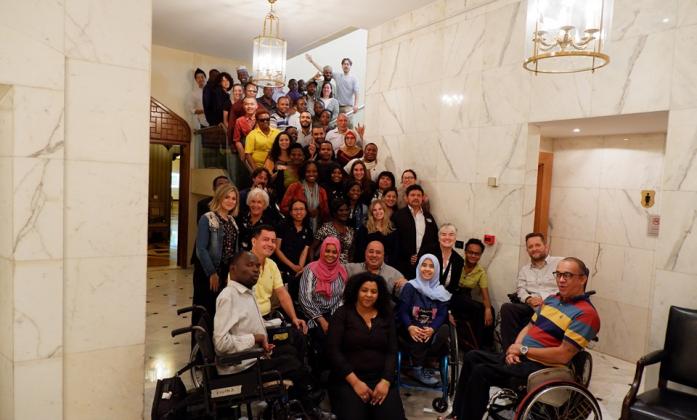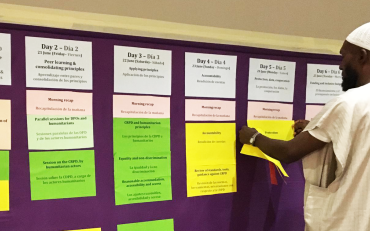From 20-27 June 2019, Beirut, Lebanon, is hosting the first Bridge CRPD-SDGs Module 3 on the Article 11 of the CRPD.
This is the first ever global Bridge training on Art 11 of the CRPD, with the participation of DPO representatives and humanitarian actors, organised by the International Disability Alliance (IDA), the International Disability and Development Consortium (IDDC) and their members, in particular CBM; with support from the Arab Organisation of Persons with Disabilities (AOPD) and HI, and funded by Disabled People's Organisations Denmark (DPOD), CBM, the Australian Department of Foreign Affairs and Trade, the European Union Civil Protection and Humanitarian Aid, the Ministry for Foreign Affairs of Finland and the Bridging the Gap Project.

DOWNLOAD THE INFOGRAPHIC ABOVE!
In this page:
- Summary of Day 1
- Summary of Day 2
- Summary of Day 3
- Summary of Day 4
- Summary of Day 5
- Summary of Day 6
- Summary of Day 7
- Summary of Day 8
Videos / Testimonies:
- Interview to Agnes Abukito, Inclusion Support Team to the Bridge CRPD-SDGs Module 3. Video with subtitles at: https://youtu.be/LVU3ndltIKg
- Interview to Jessica Kay from Save the Children. Video with subtitles at https://youtu.be/x6NtOkP-MFs
- Interview to Rahma Mustafa, Sudan National Union of Persons with Physical Disability. Video with subtitles at https://youtu.be/iV2m3IH4L_8
- Poem of Elizabeth Ombati - from World Network of Users and Survivors of Psychiatry (WNUSP) and IDA Bridge CRPD-SDGs Fellow and facilitator - on the themes that had been touched upon from the beginning of the training week until Day 4 https://youtu.be/2uSG5xndLQ8
-
Sulayman Abdulmumuni Ujah from the Joint National Association of Persons with Disabilities, Nigeria, tells about the last day of Bridge training module 3 on CRPD Article 11. Video with subtitles available at https://youtu.be/_nuxD_JcMy8
Downloads:
- List of participants (Word format here)
- Concept Note
- Meeting Agenda (Word format here)
- Using the CRPD to promote inclusive humanitarian action
Quick links:
- Bridge CRPD-SDGs dedicated web page;
- Inclusive humanitarian action and Disaster Risk Reduction;
- IASC Guidelines on Inclusion of Persons with Disabilities in Humanitarian Action.
- Analysis of the synergies between Sendai Framework, HRC Resolution and Humanitarian Charter from a CRPD perspective 2015 - 2018
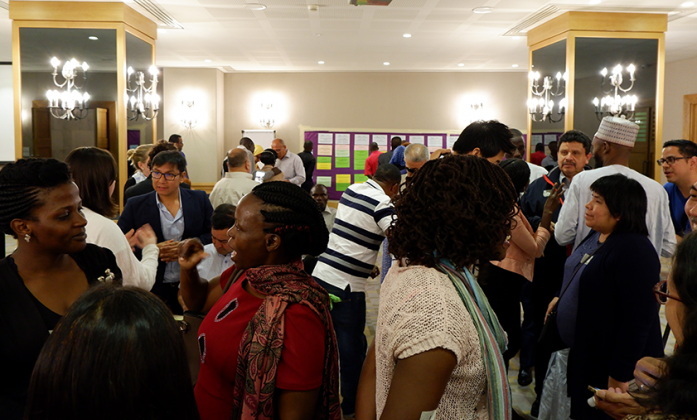
Background
The barriers and the discrimination faced by persons with disabilities in everyday life are greatly amplified when society breaks down as a result of crises such as conflicts or natural disasters. The obligation of State Parties to ensure the protection and safety of persons with disabilities in such situations is enshrined in the United Nations Convention on the Rights of Persons with Disabilities (CRPD), in particular Article 11:“Situations of risk and humanitarian emergencies”.
Following the adoption of the Sendai Framework in March 2015, the Resolution 31/6 of the Human Rights Council (HRC) adopted in March 2016 and the launch of the Charter on Inclusion of Persons with Disabilities in Humanitarian Action at the World Humanitarian Summit in May 2016, there has been significant movement towards addressing the inclusion of persons with disabilities in situations of risk and humanitarian action. This includes the creation of an Inter-Agency Standing Committee (IASC) Task Team, which is responsible for developing IASC Guidelines on Inclusion of Persons with Disabilities in Humanitarian Action.
Bridging DPO representatives and humanitarian actors
This Bridge CRPD-SDGs Module 3 also follows an increased demand from DPOs and the actors involved with the Bridge Initiative to have in-depth training on the Article 11 of the CRPD. As the first initiative of its kind, this Bridge CRPD-SDGs Module 3 focused on the Article 11 of the CRPD is a global pilot. As such, it engages Bridge Alumni that participated in previous Bridge CRPD-SDGs since 2015, namely Bridge Latin America, South East Asia, Pacific, East and Western Africa, Big Lakes, the Middle East and North Africa, Indonesia and Timor Lest and Uganda. It also engages humanitarian actors working towards inclusive humanitarian action.
The 28 participants, 7 co-facilitators, 4 inclusion support team members, 3 observers, 16 support people such interpreters, sign language interpreters and guide-interpreters, and 4 logistical and communication support, bring a wide range of experiences from DPOs and humanitarian actors from 30 countries and 5 Regions around the world.
The training will be facilitated in English with simultaneous interpretation into Spanish, Bahasa Indonesia and different national sign languages; with participants and co-facilitators from different groups of persons with disabilities, including persons with intellectual disabilities, deaf-blindness, cerebral palsy, albinism and deaf people, among others.
The program of the week includes detailed analysis and examination of the key concepts of the CRPD applied to the humanitarian machinery, with bridges between human rights and humanitarian international law, processes and mechanisms. Developing an in-depth training in this manner provides an opportunity to strengthen the relationship between DPOs and humanitarian actors, foster a better understanding of each other's strengths and roles and promote networking and future partnerships.
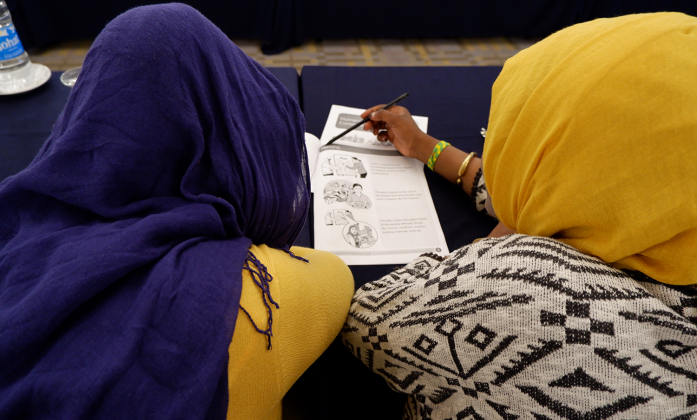
Preparatory meetings with facilitators and under-represented groups
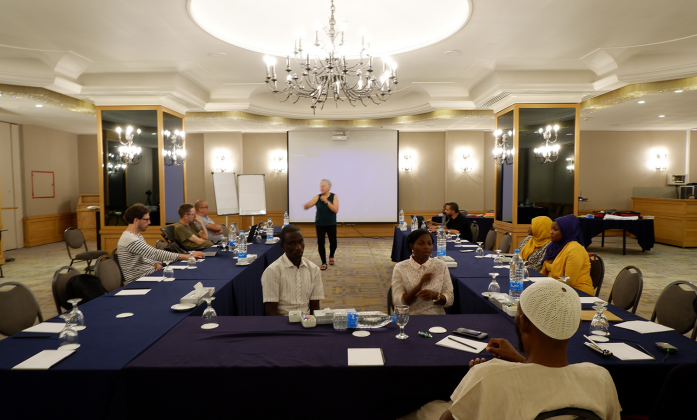
On 18 June 2019, the co-facilitators met to finalise the preparations of the workshop. Co-facilitators of this module are: Abner Manlapaz, Life Haven Center for Independent Living, Philippines, Elizabeth Ombati, World Network of Users and Survivors of Psychiatry (WNUSP) and Bridge CRPD-SDGs Fellow, Kenya, Gordon Rattray, CBM's Emergency Response Unit, Belgium, Imed Ouertani, Bridge CRPD-SDGs lead trainer, Tunisia, Kathy Al'jubeh, CBM Senior Advisor for Inclusive Development, Ireland, Ricardo Pla Cordero, IRC Risk Mitigation and Inclusion Advisor, Spain and Tchaurea Fleury, International Disability Alliance (IDA) and Bridge CRPD-SDGs Coordinator, Brazil.
On 19 June 2019, there was a preparatory meeting for under-represented groups, with the support from the Inclusion Support Team, with Agnes Abukito, World Federation of the Deaf Blind, Uganda Betty Najjemba, African Disability Forum (ADF) Learning Coordinator, Uganda, Jenipher Akinyi, Inclusion Africa, Kenya, Rosario Galarza, RIADIS, Peru.
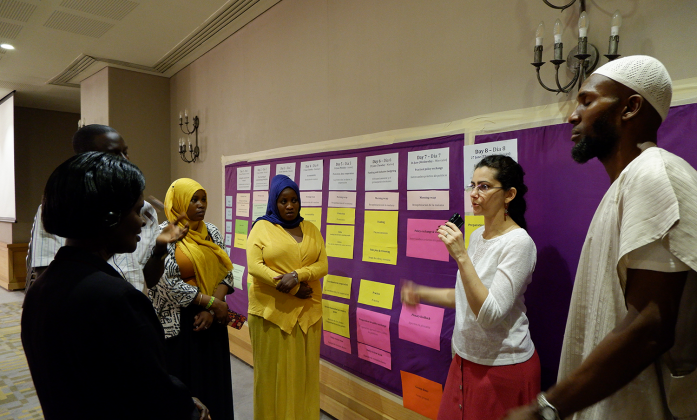
Testimonies:
Agnes Abukito, member of the Inclusion Support Team to the Bridge CRPD-SDGs Module 3, shares her expectations on the workshop during the preparatory meeting for under-represented groups. Watch the short video with subtitles at: https://youtu.be/LVU3ndltIKg
The facilitation team and the inclusion support team of this Bridge Module 3 on Art 11 are part of the training trajectory for future regional Bridges on the Art 11.
To know more about the initiative, please visit the main web page dedicated to the Bridge CRPD-SDGs training.
In the opening session, the facilitation team presented the agenda and all feedback mechanisms, namely, Moodmoter, traffic light card, daily journal, daily evaluation team, among many others. A general recap on fundamental CRPD articles and humanitarian principles was made.
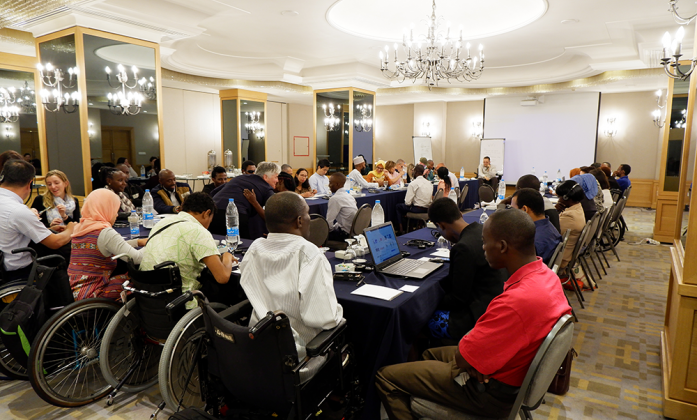
At the beginning of the meeting, participants were asked to write down two or three key expectations for the training. After the feedback was collected, the meeting facilitator noted that the main expectations are:
- To have networking opportunities between DPOs and DPOs or between humanitarian actors and DPOs
- To acquire more knowledge on frameworks/systems such as the UN CRPD, Sendai Framework for Disaster Risk Reduction, the Humanitarian Principles, plus recent developments and synergies and to learn more about the humanitarian program cycle, advocacy, and influencing localisation in funding and data
- To include the perspective of under-represented groups in humanitarian action and disaster risk reduction
- To know each other on a human and practical level to support the establishment of work for future collaborations
- To recognise good practices on the inclusion of persons with disabilities in situations of risk and humanitarian emergencies
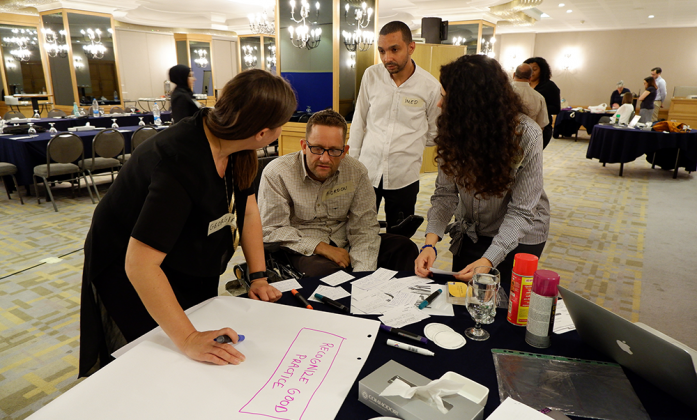
The group had the chance to get to know each other and to jointly create a list of rules that will help make the communications accessible to everyone throughout the week. The list of accessibility rules included reminding to describe information that are shown on PowerPoint presentation, or to describe what is happening in the room, in order to allow all colleagues to meaningfully participate in the training.
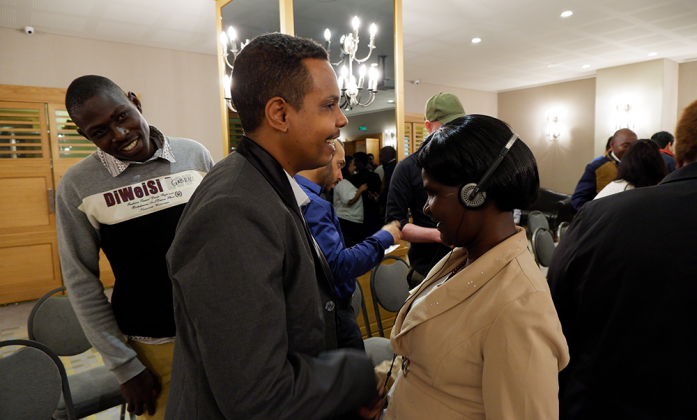
Game of life:
In the second part of the first day of the Bridge CRPD-SDG Module 3 on Article 11 of the CRPD, participants engaged in an exercise called “Game of life” aimed to analyse the opportunities that persons with disabilities have in their lives, depending on the cultural and social environment they live in.
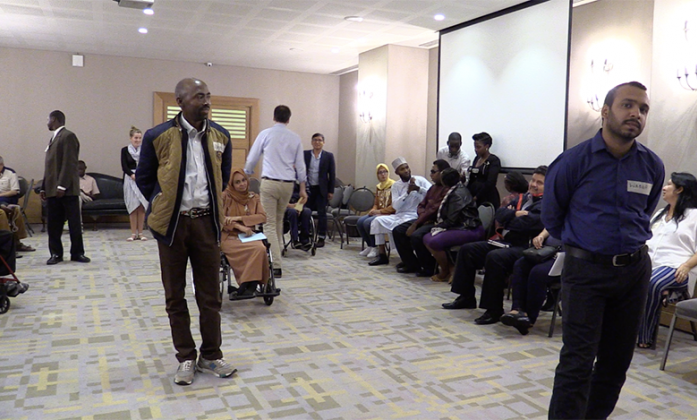
Humanitarian game:
Participants were exposed to the reality in humanitarian situation, where violence can occur. In this way, they could propose ways to resolve the issues in an inclusive way.
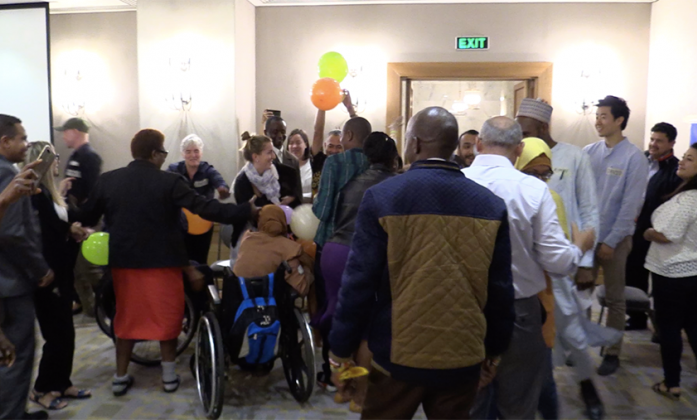
After that, participants broke out in two groups. The humanitarian actors sat together to consolidate their knowledge about the CRPD, while the DPO participants focused on gaining knowledge on the humanitarian framework.
Morning recap
In the morning of day 2 of Bridge, participants had the opportunity to revisit the day 1 providing feedback on key learning messages of the first day.
It was noted by participants that the ‘Game of life’ was an opportunity to better understand what are the barriers facing persons with disabilities throughout their lives, such as access to education, employment and freedom of choice.
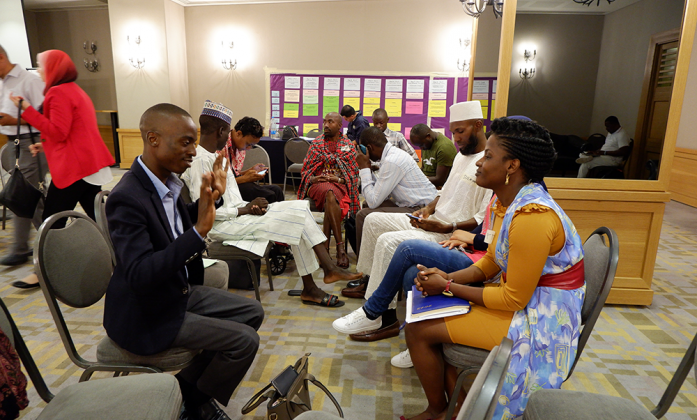
Preparatory parallel session for DPOs representatives and humanitarian actors:
Still in the morning, participants split again in two groups: humanitarian actors and DPOs. The two groups continued their conversation from day 1 to deepen their knowledge on the human rights and humanitarian sectors.
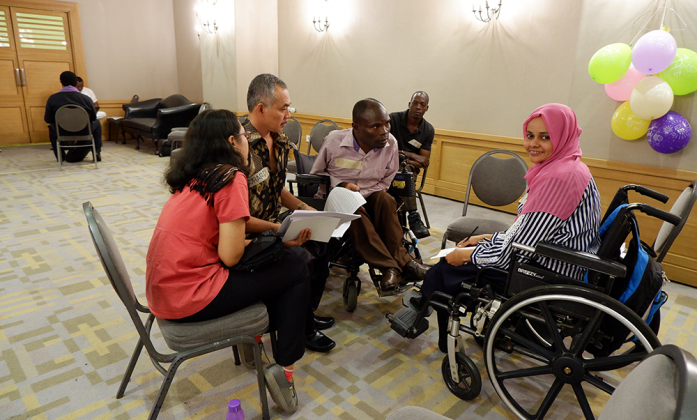
Sessions on the CRPD by humanitarian actors and on humanitarian action by DPO representatives
Humanitarian actors presented key points and messages from the CRPD using different facilitation tools, including using draws. The brief presentation focused on the purpose of the CRPD, it debated the concept of disability, stressing on the barriers imposed by society. The group used a role play to bring reflections on the States general obligations. The activity was followed by exchanges on specific articles of the CRPD, as article 6 on women with disabilities, 24 on inclusive education, 19 on living independently and being included in the community, art 32 on international cooperation and the role of humanitarian actors to supporting national efforts in the CRPD implementation. The session was concluded recalling that the CRPD represents a paradigm shift to development and humanitarian action.
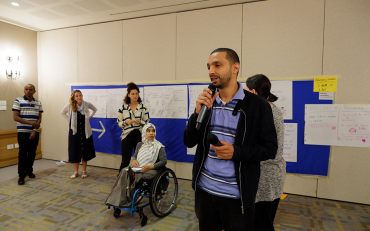
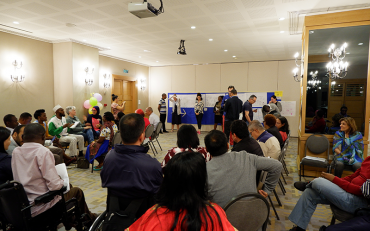
The DPO’s group presented the general humanitarian architecure with the key principles, legal frameworks, varied role of humanitarian actors and the humanitarian program cycle. The presentation was followed by an active sharing among participants.
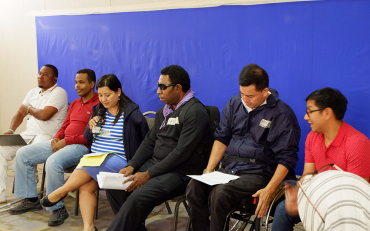

Interactive history timeline
The day concluded with an interactive session on the participants working in groups and jointly recalling relevant human rights and humanitarian frameworks, tools, mechanisms and political agreements from the 40's up today. The feedback was very rich with inclusion of international human rights and humanitarian mechanisms and legal frameworks, such as the 2030 Agenda, ending with the freshly adoped resolution 2475 of the UN Security Council on the situation of person with disabilities in armed conflict and humanitarian crises.
The Moodometer of the day was very positive with over 90% overall evaluation between 7 and 12, in a scale of 0 to 10.
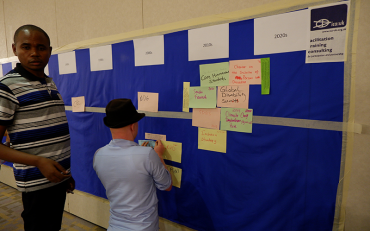
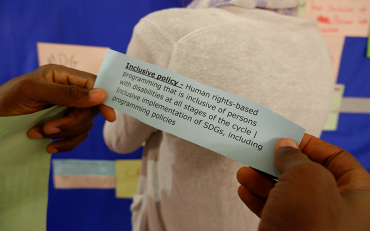
Watch a video interview to a participant, Jessica Kay from Save the Children, explaining the importance of this training at https://youtu.be/x6NtOkP-MFs
The third day of the Bridge CRPD-SDGs training Module 3 on Article 11 of the CRPD started with a recap of the learning from the previous day. After that, considering the humanitarian principles and the general principles of the CRPD, participants split into different groups and analyse scenarios to find out how to implement both set of principles in their daily work and actions.
Participants realised that both humanitarian and CRPD principles are about the respect of the person, the right to make choices, and the opportunity to find an adequate support. Participants were invited to analyse a hypothetical situation in which a young woman who does not speak is found in a territory at risk. Participants discussed how they would react to accommodate and approach her, raising a very engaging discussion on freedom of choice, legal capacity and dignity of the person.
After the morning break, there was a reflection on the meaning of equality and discrimination on the basis of disability.
After a 3-minutes sensory break, a session was held on access, accessibility and reasonable accommodation, with a focus also on ‘universal design’.
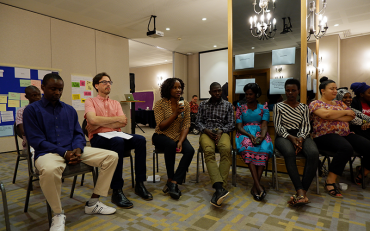
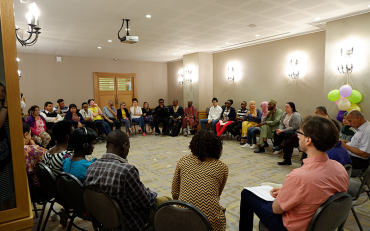
In the afternoon, the group further analysed a series of scenarios related to methods to consult and involve persons with disabilities during humanitarian emergencies, through a ‘4 corners’ activity. Participants had to react to controversial statements expressing ‘strong agreement’, ‘agreement’, ‘disagreement’ or ‘strong disagreement’. After each statement, participants were invited to explained their positions against each statement.
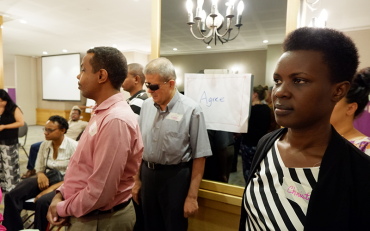
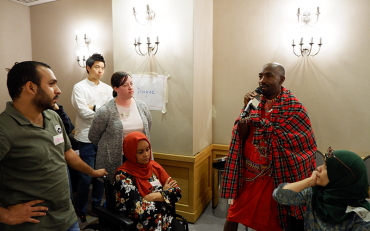
Following that, there was an interactive exercise that comprised a simulation of a cluster meeting where participants represented different kinds of stakeholders and had to coordinate in and respond to a situation of emergency. The stakeholder involved were divided into groups representing the Social Welfare Office, Local Chief Executive, Military personnel, Civil Society Organisation, World Food Programme, Red Cross, World Health Organisation and DPOs. This exercise, helped the participants to really understand and share on what a consultation, in this case a cluster meeting, should happen respecting perspectives of both DPOs and humanitarian actors and CRPD and Humanitarian Principles.
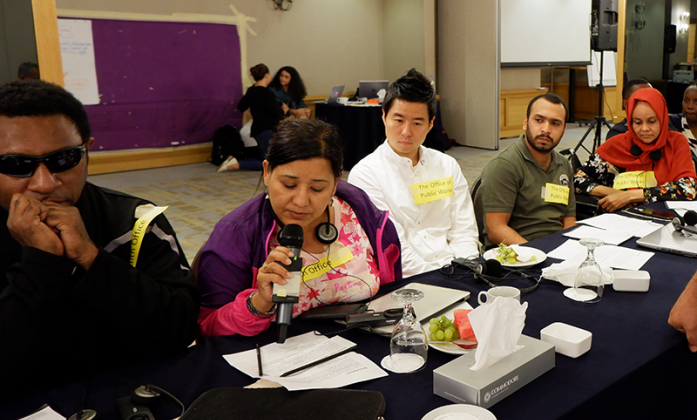
The day was concluded by a very positive evaluation.
Bridge Module 3 on Art 11 started its 4thday with participants revisiting the main learnings from day 3, including the concepts of accessibility, reasonable accommodation, non-discrimination, and the linkages among those topics.
The second session was an extended recap to deepen understanding on the topics that were touched upon the day before. There was a broader discussion regarding the Cluster System and Approach. Participants shared on the history that brought to the existence of the Cluster, how does this look like, its development and how to engage with it.
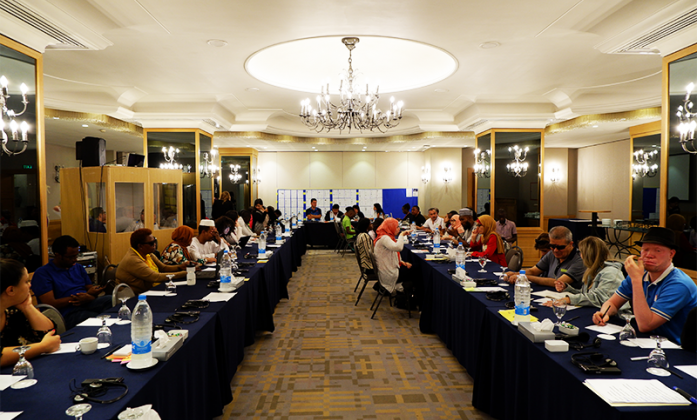
It was realised that if the clusters are not solid and inclusive of persons with disabilities and their representative organisations, they would not be effective and would create lack of information and effectiveness, thus, further barriers to persons with disabilities.
Following that activity, participants engaged in an interactive exercise, where they were asked to reflect how equality and non-discrimination could be assessed in different scenarios. The group was divided in small groups representing different actors, including Clusters. After the work in break-out groups, each group feedback how they applied equality and non-discrimination to concrete situations.
In the second part of the morning, participants consolidated their knowledge on the “Four As and one Q” assessment tool to measure public policies, namely Availability, Accessibility, Affordability, Acceptability, Quality.
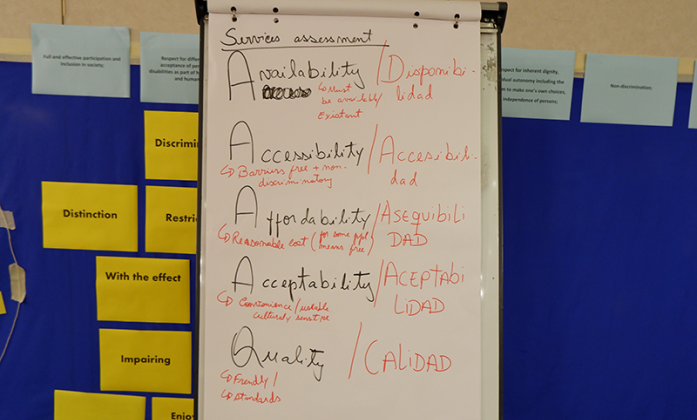
The day was concluded with a session on global humanitarian different standards, tools, guidance. The group was divided in 5 smaller groups and each of them received a small background material (including in Spanish, Arabic and Braille) explaining the tool/standard and its background. The 5 different standards/tools concentrated on the Gender and Age Marker, the ECHO guidance, the Humanitarian Hands on Tool (HHOT), the Core Humanitarian Standard and the Washington Group Set of Questions. The group worked with the ‘traffic light tool’, observing their compliance vis-à-vis the CRPD. Each group feedback using the traffic light identifying what is compliant with the CRPD, what should be improved and what needs to be changed.
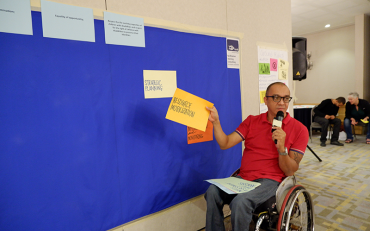
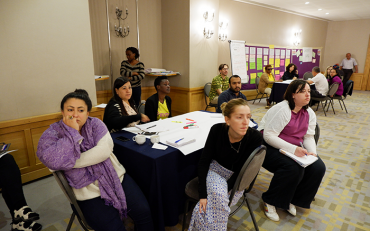
The day was closed by a very positive evaluation from the group.
Recap
The day was dedicated to sessions on accountability, protection and data. It began with reflections on the learning and activities which happened the previous day.
Elizabeth Ombati - from World Network of Users and Survivors of Psychiatry (WNUSP) and IDA Bridge CRPD-SDGs Fellow and facilitator - shared a poem taking participants through all the themes that had been touched upon from the beginning of the training week. Video: https://youtu.be/2uSG5xndLQ8
Accountability
The aim of this session was to ensure that participants have a common understanding of accountability mechanisms, including individual and collective responsibility to promote peer accountability and play a part to hold duty bearers to account. There was an individual moment of reflection, then, per peers, participants were invited to creatively share on how accountability should work.
One of the participants stressed the importance to make sure that accountability includes the notion of participation and meaningful involvement.
Following this introduction, participants split into 5 groups and discussed accountability in different levels: Individual, organizational, sector/clusters, at national and international levels.
For example, the group that focused on accountability at individual level presented a case of registration of a complaint using a hotline, with the need to have an answer within 24 hours. The group explained the challenges in the process of submitting a complaint and the consequences if this person does not get the answer on time.
The group that focused on accountability at organizational level, stressed the need to make implementation transparent, as well as to have information and communication in accessible formats, including regarding feedback mechanisms.
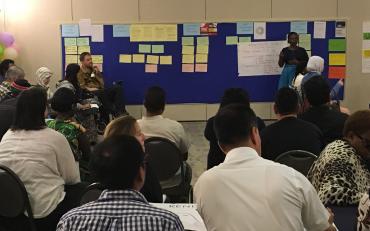
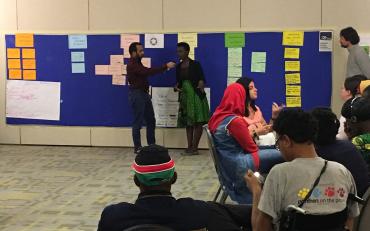
Session on Protection
The session aimed at introducing how “protection” is understood and framed within humanitarian policies and approaches, and how this understanding can be completed and enhanced by the CRPD to protect all rights of all persons with disabilities affected by conflict and disaster.
The session started by asking participants about their own understanding of “protection” to highlight how this concept has multiple angles and ways of being interpreted by different people.
A short video (available here) introducing the “Protection Mainstreaming” approach was then displayed to all the participants. Then, participants received the four protection principles that this approach focuses on, namely:
- Prioritizing safety, dignity and avoid causing harm;
- Meaningful access;
- Participation and empowerment;
- Accountability.
The four principles were distributed in multiple formats, including in Arabic, Spanish and English subtitles were made available for the video, and audio description was provided by one of the lead trainers as a way of enhancing the accessibility of the video, as this feature was not available. The visioning was followed by a practical exercise where participants re-visited a case study used in a previous session, inviting them to reflect on what they would do differently if they had a “second opportunity”.
Participants experienced the additional value of having these protection principles laid out in a practical approach, as aligned with the CRPD principles. In particular participation and accountability were mentioned by participants as giving them ideas to add more practical actions in the case study.
The exercise was followed by a simulated interview between a humanitarian protection worker and a DPO representative to identify controversial topics regarding protection in humanitarian action and open a debate with the group. The debate gave opportunity to participants to share their opinions about contentious points and add additional concerns and opportunities regarding how protection of persons with disabilities can be better understood and enhanced in humanitarian action.
One main aspect shared was the “tension” existing between “needs-based” and “rights-based” language and approaches, and how protection should ensure rights above needs, which cannot be covered without the former. A suggestion was to observe the jurisprudence of the CRPD Committee that no longer talks about needs, but about requirements of the person.
The session was closed with the definition of Protection developed by the Inter-Agency Standing Committee, and how it is reflected in the “humanitarian imperative”.
Session on Data
The introduction to the session questioned participants how and why we use data in our daily life, leading into a reminder of how critical data is on humanitarian action – not just to count people but to be able to plan and design interventions, in all stages of the Humanitarian Programme Cycle (HPC).
The group was divided in 6 groups, corresponding to the stages of the humanitarian cycle (including emergency preparedness). Each group received the task to reflect on what data would be needed for their correspondent stage.
After an initial reflection, they received a section of the IASC standards and then they were asked to compare against what they had found. Each group shared their key messages in the plenary wrap up, with the key messages being:
- Data is key throughout the cycle,
- In case data lacks in the beginning, it is important to refining and sharing so it deepens the quality of planning and response as it is implemented,
- The more data available before linking and coordinating with local actors, the better, in particular through Disaster Risk Reduction (DRR) work in communities,
- It is never too late to start collecting data; but equally important is to share it. It is key that all actors, including DPOs, share data. It is critical for planning and accountability as well as to ensure protection and quality of services,
- It is important to not be limited to narrowly counting people with disability, but also on types of services, their localities, who is working on what, and the resources from pre-positioned stock to staffing and specialisations,
- Disaggregated data is also important to know who in the community is accessing what and to make sure the Humanitarian Principles of humanity, impartiality, neutrality and independence can be used.
Then, participants were introduced to the Data tool from HI - the flow chart - and how this tool leads on to get more familiar with the Washington Group Short Set of Questions.
The day was concluded with the exercise “What would you do differently in your work as a result of all your today’s learning”, with main statements being:
- changing the language from ‘needs-based’ to rights-based’ in project proposals and reports,
- to reflect accessibility in all program cycle,
- share on what was learned,
- use the WG set of questions,
- consider the principle of transparency throughout the programme stages and adopt a complain mechanism to reflect complaints and feedback,
- to make sure accountability is the first,
- try to provide further funds to DPOs or ensure data on persons with disabilities will be collected and analysed throughout the different cycles,
- ensure active participation of persons with disabilities,
- applying interconnection of CRPD and humanitarian principles,
- be more accountable to grassroots,
- apply this knowledge to the advisory work in the organization, including by integrating these to training materials and use as support of advocacy.
Despite being very conceptual, the day was well evaluated by participants and co-facilitators.
The morning started with a brief recap, which was followed by a daily session on funding.
The group was divided in eight groups, being the Humanitarian Coordination Office (HCO), 3 international NGOs, 2 national NGOs and 2 national DPOs. All groups, excepting the HCO, applied for funds to respond to emergency situations in Madagascar. The relevant information was accessed over the internet.
The exercise applied to a real process in an emergency funding, with the aim for participants to experience all the challenges that DPOs may have to overcome to fully and meaningfully participate in this type of process.
The session was concluded with a plenary exchange on the power dynamics around funding humanitarian actions.
The day was concluded with the preparatory session for the next day informal exchange with the following different stakeholders:
- International Rescue Committee (IRC),
- Office of the High Commissioner for Human Rights (OHCHR),
- United Nations Economic and Social Commission for Western Asia (UN ESCWA),
- United Nations High Commissioner for Refugees (UNHCR),
- World Food Programme (WFP)
- Ghassan Kanafani Cultural Foundation - Medical Aid for Palestinians (MAP)
In addition, a technical exchange was proposed on cash transfer programming in humanitarian action.
Participants had the option to select their top 3 priority informal exchanges and the facilitation team succeed to accommodate them all into their top 2 first choices.
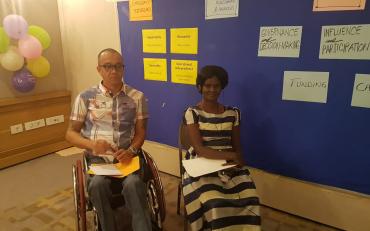
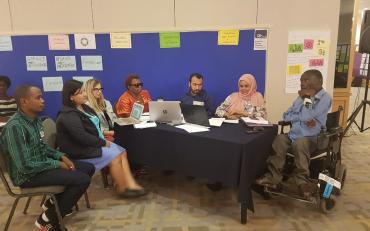
Evening session and dialogues on AWID Forum
On the 6th day, women participants had an evening session which was dedicated to discussions around the upcoming AWID 2020 International Forum. Based on learnings at the last Forum, AWID is organizing a series of listening and learning conversations to inform their thinking and work toward the next Forum. This evening session therefore was dedicated to having conversations around a broader understanding of accessibility to feed into these AWID conversations in addition to ensuring on how from the very beginning of the planning process, there is a wide range of women activists from very diverse backgrounds as part of these pre-AWID dialogues.
There was in-depth sharing from the participants on how to ensure their full and effective participation in the Forum in addition to giving recommendations to AWID on ensuringaccessibility throughout the process. The participants also proposed topics of interest to be considered in the Forum and also spoke to the importance of having women with disabilities including across mainstream agenda as another important inter-sectional piece, but also increasing visibility of all women with disabilities with very wide range of diverse impairments.
Going forward the Bridge Alumni women with disabilities and their allies made commitment to support the pre-AWID dialogues and create conversations in the lead up to the AWID Forum including through being part of a webinar, in collaboration with AWID, in the near future to build up on these initial conversations.
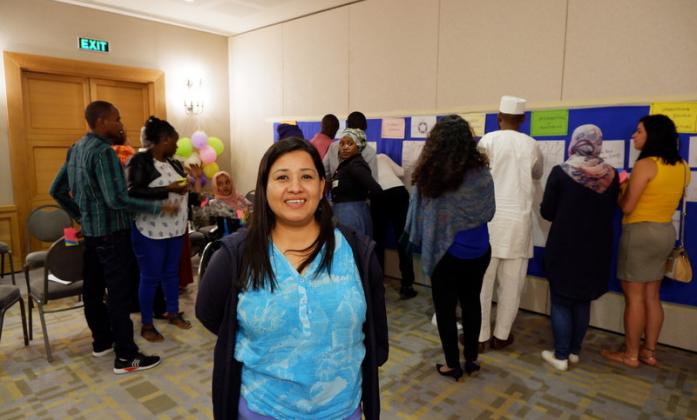
External visits:
Early in the morning of Day 7, two groups of participants left the hotel to meet representatives of the World Food Programme (WFP) and to visit the Medical Aid center for Palestinians, at the Ghassan Kanafani Cultural Foundation.
Meetings with stakeholders:
The other 5 groups stayed in the hotel and met representatives from the International Rescue Committee, the Office of the High Commissioner for Human Rights, United Nations Economic and Social Commission for Western Asia, and the United Nations High Commissioner for Refugees and had a technical session on CASH transfer programming.
- International Rescue Committee (IRC)
Carole Stephan, Integrated Early Childhood Development Coordinator at IRC, presented on the initiative called the “Sesame workshop” explaining how children can be supported to learn how to be inclusive and to grow up in a stigma- and barriers - free school environment, having a rich exchange with participants.
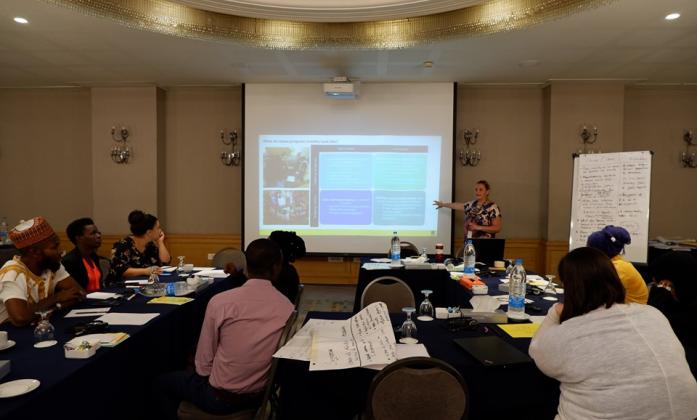
- Office of the High Commissioner for Human Rights (OHCHR)
Ulrik Halsteen, Team Leader in Lebanon and North Africa, presented their work on advancing human rights for all people in the region, in particular, he shared on administration of justice, use of human rights mechanisms and their work against torture. Participants from different regions shared their experiences.

- United Nations Economic and Social Commission for Western Asia (UN ESCWA)
Gisela Nauk, Chief of the Inclusive Social, Development Section, and her colleague, Alaa Sebeh, shared on how UN ESCWA is currently working on data collection on persons with disabilities in the region. Their presentations were followed by an exchange with participants from different regions.
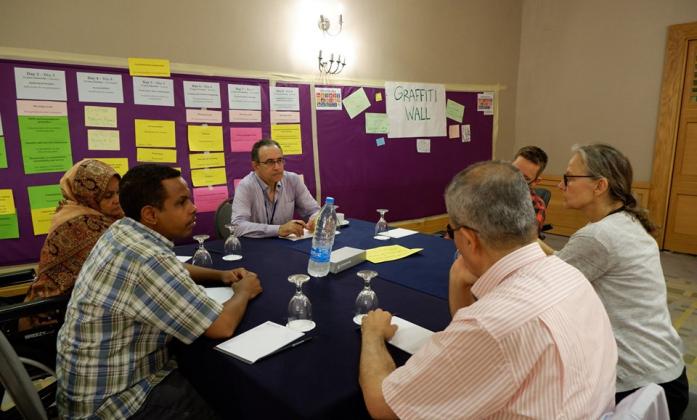
- United Nations High Commissioner for Refugees (UNHCR)
Pedro Munoz Alonso, Associate Protection Officer (Community-Based), presented the UNHCR work in the thematic area of humanitarian situations in Lebanon and in the MENA region, with a focus on interventions targeting persons with disabilities. This referred to both tailored programming and the inclusion of persons with disabilities across all interventions in UNHCR. Participants shared their own experiences from Africa, Latin America and Asia - Pacific.
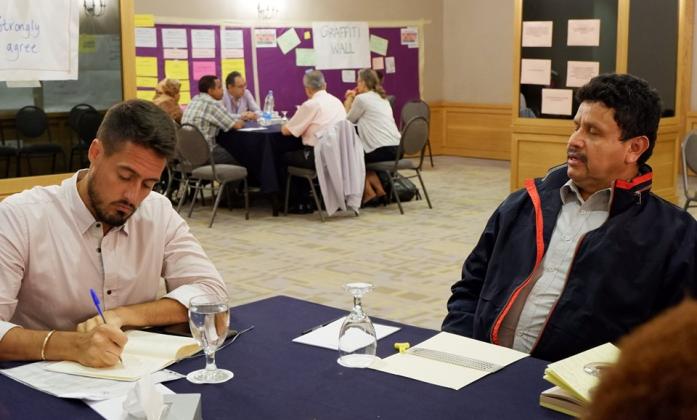
In the afternoon, the group met in plenary to a feedback session, with a representative from each group sharing the main messages of their learnings and sharing.
The day was concluded with a plenary exchange with Nishalini Nair, Cultural Orientation Trainer of the International Organization for Migration (IOM) who shared with the group on the preparation of migrants and their families towards Australia, including people with disabilities.
In the evening, the group enjoyed a deserved social diner close to the Raouche Rocks (without alcohol!).
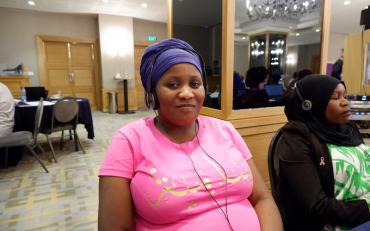
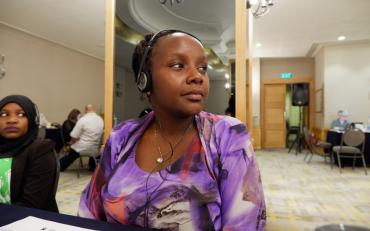
The final day of the “Marathon Bridge” started by a revisit of key issues touched upon during the entire training. Then, they broke-out into a ‘Café burning questions’ session, within five groups to discuss specific themes. The groups were divided on
(a) CRPD - No bad questions,
(b) Gender transformative humanitarian action - Let’s explore it!,
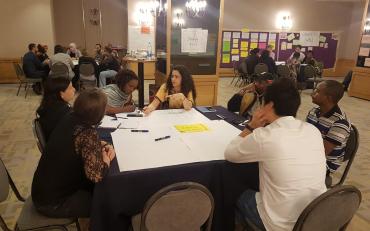
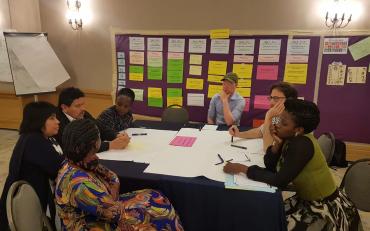
(c) Inclusive budgeting - Some key tips,
(d) Inclusive humanitarian action – Do & don’ts,
(e) Trouble-shooting using the Washington Group Short Set of Questions.
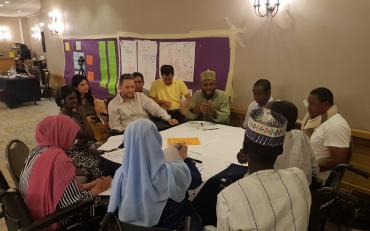
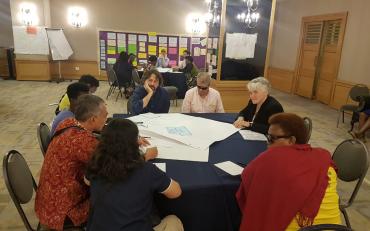
Participants had the opportunity to visit different groups. A plenary wrap-up followed the session.
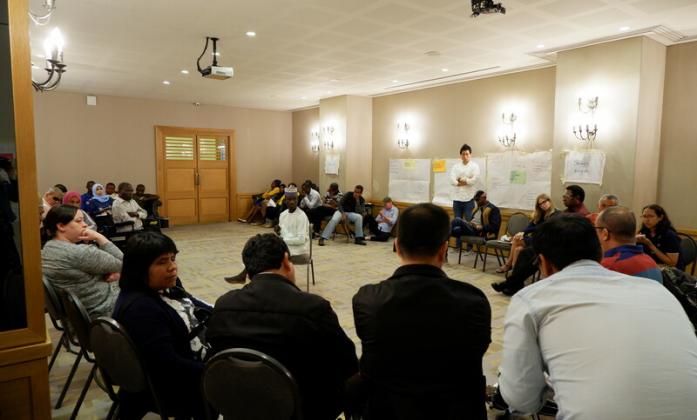
The morning closed with another ‘4 corners activities’ with questions related to the CRPD and inclusive humanitarian action.
At the end of the day, participants shared their reflections on the training and the day ended with a very positive feedback. Participants shared ‘appreciation messages’ and ‘commitment’ with other participants and with co-facilitators and filled out the evaluation form to support the Bridge team in improving the Bridge Initiative.
Agnes Abukito, Bridge ToT Alumni and member of the World Federation of the Deafblind, sang a ‘recap song’ regarding the entire Bridge – week.
Jahda Khalil, from the Arab Organisation of Persons with Disabilities (AOPD) and Bridge co-leaders closed the Bridge Art 11 reinforcing the importance of this module to both organisations of persons with disabilities and inclusive humanitarian action. As a follow-up action, participants agreed to have a joint email and WhatsApp group, so they can continue sharing their experiences ahead of this Bridge.
A comprehensive report will be produced soon. For further information contact the Bridge Coordinator at tfleury [at] ida-secretariat.org.
